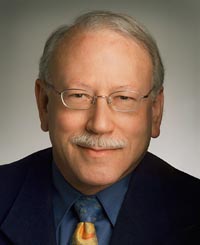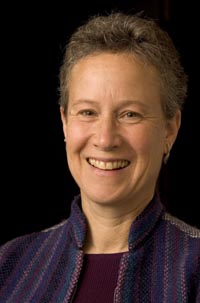Four research programs headquartered at UC Santa Cruz have received awards in the 2009 UC Multi-Campus Research Programs and Initiatives Competition (MRPI).
The four programs-all directed by UCSC faculty-will be funded for a total of $6.3 million over a five-year period, with each of the programs expending effort on multiple UC campuses.
The MRPI awards are based on excellence of research, competitiveness and innovation, and the impact and benefits of the programs to the UC system.
They are presented to collaborative research projects that involve three or more campuses, and to programs that focus on topics important to both UC and the state of California.
Of the 28 awards conferred, UC San Francisco and UC Irvine joined UCSC in receiving four awards, UC Berkeley and UC San Diego earned three, and UC Davis, two. UC Santa Barbara was the top award-winner with a total of five.
"We are delighted at the success of our UCSC faculty in winning these programs in the face of intense competition across the 10 UC campuses," noted Bruce Margon, UCSC vice chancellor for research.
"We have always considered one of UCSC's greatest strengths as bringing front-line, internationally recognized research to our students in a small, intimate environment, and this is just the latest example," said Margon.
"We're particularly pleased that these new centers will span not just the technical fields, but also the humanities and social sciences, reflecting the broad diversity of our campus programs," he added.
UCSC garnered two awards for proposals in the Humanities, one in the area of Emerging Sciences & Technology, and one in the Social Sciences.
The following programs received awards:
. High Performance AstroComputing Center-directed by physics professor Joel Primack
. Collaborative Research for an Equitable California-co-directed by education professor Rodney Ogawa and associate education professor Ronald Glass
. Pacific Rim Research Program-directed by history professor Gail Hershatter
. Mediterranean Studies Multi-Campus Research Project-co-directed by associate history professor Brian Catlos and literature professor Sharon Kinoshita
The High Performance AstroComputing Center (HIPACC) will focus on computational astrophysics-using the growing power of supercomputers to address the most difficult problems in astrophysics and cosmology.
The purpose of the center is to realize the full potential of UC's groundbreaking computational astrophysicists by enhancing their interactions with each other and their use of data. This multidisciplinary effort will link theoretical and observational astrophysicists, physicists, Earth and planetary scientists, applied mathematicians, and computer scientists at nine UC campuses and three national laboratories.
"Individual UC and lab teams are fairly well funded, but we do not routinely share knowledge, postdocs, students, or computing resources," noted UCSC professor of physics Joel Primack, who will direct the center. "Because of our broad and complementary expertise, much can be gained by promoting cross-fertilization and also by fostering a tradition of systemwide collaborations."
The Collaborative Research for an Equitable California (CREC) program will bring together university researchers with community organizations and policymakers to tackle the state's interconnected crises in education, employment, health, nutrition, housing, and the environment.
"Historically, the university has done research in education, in health care, in housing, in economic development-we want to begin where all these crises intersect," said Ronald Glass, UCSC associate professor of education who will co-direct the center with fellow education professor, Rodney Ogawa. "It's not an accident that kids who don't eat well and don't have good health care don't do very well in school."
The interdisciplinary center will establish long-term research sites around the state, ultimately growing to seven sites including one on the U.S. border with Mexico, said Glass. The goal of the center is to prepare a new generation of scholars in the social, behavioral, health, and natural sciences who are skilled in working with community-based entities, government agencies, and policymakers, and to generate strategic interventions that will benefit California.
The Pacific Rim Research Program (PRRP) funds research that increases our understanding of how regions are made and unmade, and how societies envision their futures. Administered as a systemwide program for the past 23 years, the program will now be housed on the UCSC campus under the direction of history professor Gail Hershatter.
PRRP provides grants for scholars from every UC campus to conduct cutting-edge research in and about the Pacific Rim. Investigations range from economics to the environment, migration to artistic innovation, and resource utilization to public health. This research continues to help Pacific Rim nations and peoples cooperate in confronting the challenges facing the region.
"California's connections across the region are longstanding and complex, and the knowledge we produce about the Pacific Rim is important in understanding our intertwined past and shaping our shared future," said Hershatter. She added that grants made this coming year will support research on responses to crisis in the Pacific Rim, as well as funding advanced graduate student research.
The Mediterranean Studies project will integrate UCSC's long-standing Mediterranean Studies initiative-which includes campus-based activities and an NEH Summer Institute for College and University Professors-with programs at eight other UC campuses to collaborate on a wide range of research and curricular projects.
Mediterranean Studies is an emerging interdisciplinary field that is part of the trend towards oceanic studies, environmental history, and the re-thinking of regional and national models of study in such fields as history, literature, art history, religious studies, political science, and anthropology. At present, 50 UC faculty have committed to the project, as well as nearly 100 associate scholars across the U.S., Canada, and Europe.
"The Mediterranean is of particular importance as an area of origin for religions, a shared community of Muslims, Christians, and Jews, and a historical place of exchange between Africa, Europe and Asia," said UCSC associate history professor Brian Catlos, who will co-direct the program with UCSC literature professor Sharon Kinoshita.




